The oral history of Alex Ovechkin's 'electric' first season
Wayne Gretzky walked from behind the net to the doorstep of the crease and roofed a backhand over a sprawling goalie named Glen Hanlon. It was the first goal of Gretzky's peerless career, recorded in a white No. 99 Edmonton Oilers uniform on Oct. 14, 1979.
Decades later, on Oct. 5, 2005, Hanlon watched from the Washington Capitals bench as another super rookie, Alex Ovechkin, started the clock on his own scoring rampage. Ovechkin, who'd prove to be a purer sniper than playmaking king Gretzky, blasted a one-timer from the high slot. The puck was off his stick before the standard definition broadcast could steady on No. 8 in black. Ovechkin, minutes into his career, pumped his arms in celebration.
"Right from Day 1, Ovi had this zest for the game," said Hanlon, the Capitals head coach for Ovechkin's first three seasons.
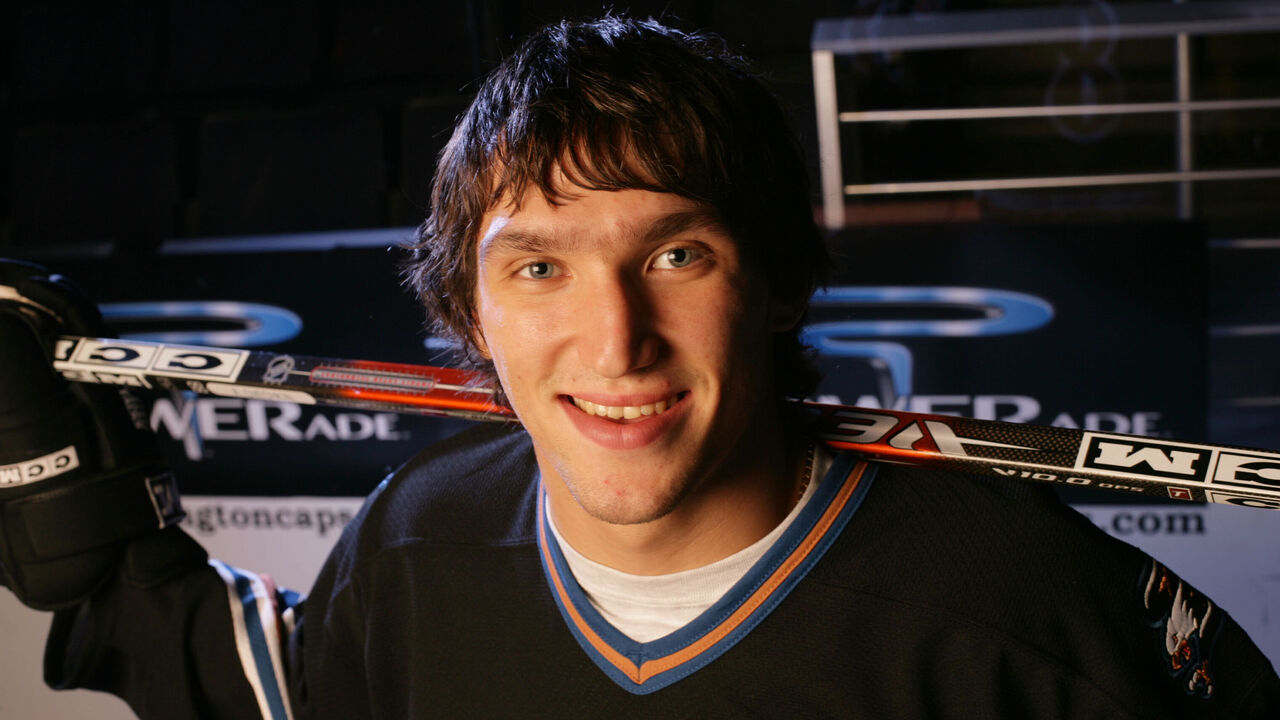
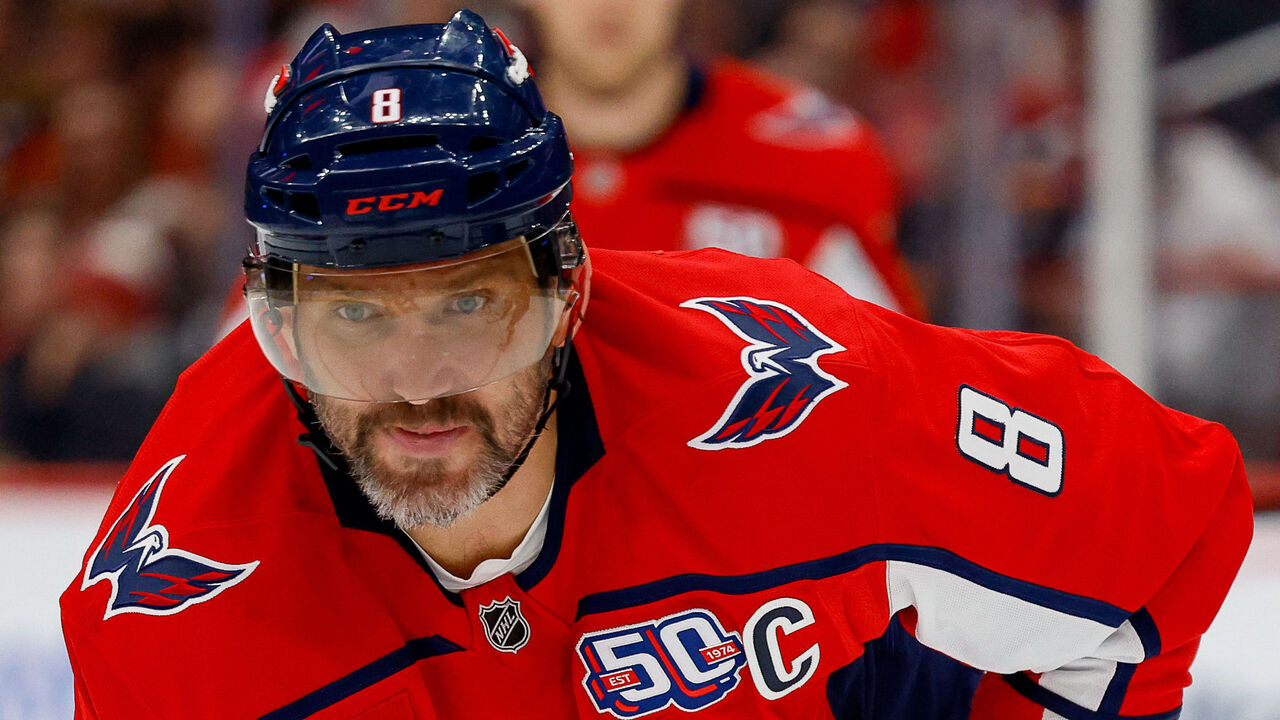
Ovechkin, now a grey-haired 39-year-old captain, is on the verge of becoming the NHL's greatest scorer. He enters Tuesday's game against the Boston Bruins with 890 career goals thanks to a remarkable 37 in a rare injury-shortened campaign. Gretzky's record of 894 was long considered unbreakable. Now it's a matter of when, not if, Ovechkin nets five more to pass him.
Ovechkin arrived in the post-lockout NHL as a wrecking ball on skates. George McPhee, the general manager who drafted Ovechkin, once called him "Pavel Bure in Mark Messier's body," which might have undersold his lethal shot. Ovechkin's staggering 52 goals and 106 points in 2005-06 easily outpaced his closest teammate, Dainius Zubrus, who had 23 goals and 57 points. Ovechkin won the Calder Trophy in a landslide over fellow league savior Sidney Crosby.
"There was a six-game goal streak in his rookie year. There was a seven-game goal streak. There was a stretch where he had goals in 12 of 14, which is absurd for somebody who was 20 years old," said Joe Beninati, the Capitals' longtime play-by-play announcer. "It was electric. And the goals weren't just common goals. They were the kind that would knock your eyes out."
We spoke with Hanlon, Beninati, and several Capitals players to relive Ovi's debut season - an exhilarating ride during which The Great 8 first flashed the potential to catch The Great One.
(Note: The following quotes were edited for clarity and length.)
'Unbridled enthusiasm and raw power'
As forward Matt Pettinger put it, the 2005-06 Capitals were an "inexperienced, naive, full-of-energy kind of team." The league was in transition, too, emerging from the lockout with a star-friendly rulebook and star-focused marketing plan. Ovechkin, the top pick in the 2004 draft, immediately met the moment.
Pettinger: He had the flair, the yellow laces, the tinted visor. He was a kid who wanted to learn and get better. There was a confidence in him, but it wasn't a cockiness.
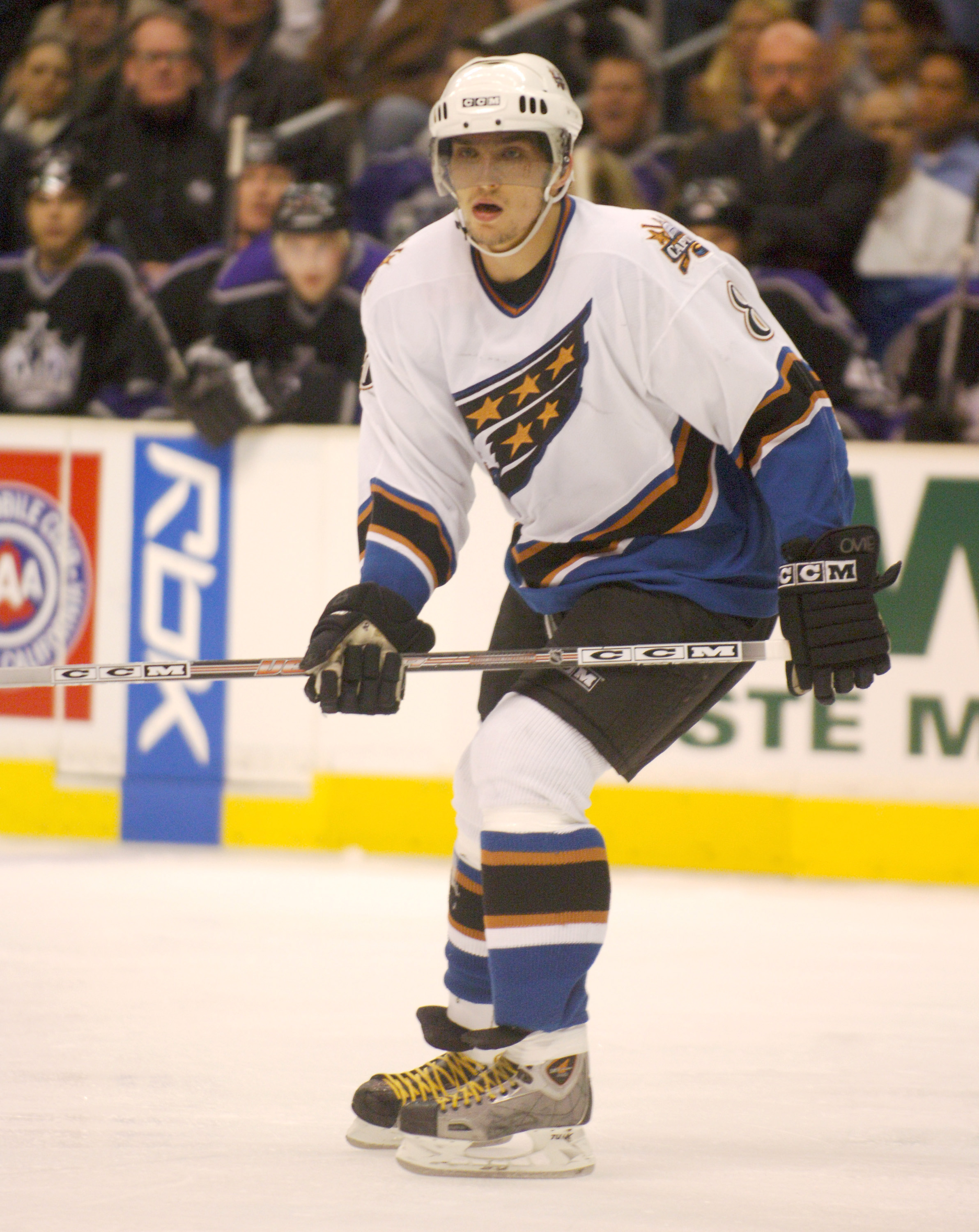
Olaf Kolzig, goaltender: I remember the first practice we had right before training camp. He took a one-timer that I was so thankful didn't hit me. It had such a different thud. As the workouts went on, the kid's enthusiasm never dropped off.
Hanlon: I was walking by the players' room in our training facility, and all the players were sitting in there. Ovi was going around and trying to pronounce their names, trying to write them in English, and just having a lot of fun with it.
Bryan Muir, defenseman: People were calling me, asking, "Should I take this guy in my fantasy pool? What's the deal?" We're going through training camp, and he was there, but he wasn't doing Ovi things yet.
Ben Clymer, defenseman: He was fine in training camp. But he wasn't next-level.
Muir: Once we dwindled down camp and got to something close to the NHL roster, he started to shine. I'll never forget one scrimmage. We're down to 32 players, 16 guys a side. He went down and scored this unbelievable goal. He was on a breakaway. He'd run two guys over. I came off the ice and said, "You guys better take this guy. He's starting to play, and I think he can do it."
Ovi exploded in the regular-season opener in D.C. with two goals off five shots, plus a thunderous body check, while logging 17:36 in a 3-2 victory over the Columbus Blue Jackets. The showstopping performance sent an unmistakable message.
Brian Sutherby, forward: Everyone remembers his first shift.
Beninati: He hit Radoslav Suchy into the boards and knocked one of the struts out - the panels that keep the Plexiglas in.
Brian Willsie, forward: That generation of guys, we'd played against or watched Bure and Sergei Fedorov and Alexander Mogilny - all of these amazingly skilled Russians. But then we see Ovi come over and in the first home game he breaks the glass on a body check. He's getting 7-10 hits per game and he's physically hurting players by hitting so hard - in addition to the skill, speed, scoring, and hockey sense. It was a full package we'd never really seen.
Sutherby: I remember sitting on the bench. Every time he touched the puck - whether he got the puck in our zone or got a pass coming up the wing - you inched closer. You felt when he was attacking the D-men with speed that something incredible was going to happen.
Chris Clark, forward: It was a preview of what was to come for the rest of the year - and the next 20 years.
Muir: If you watch him after his first goal, he kisses his glove and points to the sky. He knew that was the beginning of what he wanted to do. We, of course, didn't know in the moment how meaningful it was to him.
Beninati: The kiss wasn't showboating of any sort. It was a salute to his brother, Sergei, who passed away when he was young. Alex would name his first child after Sergei.
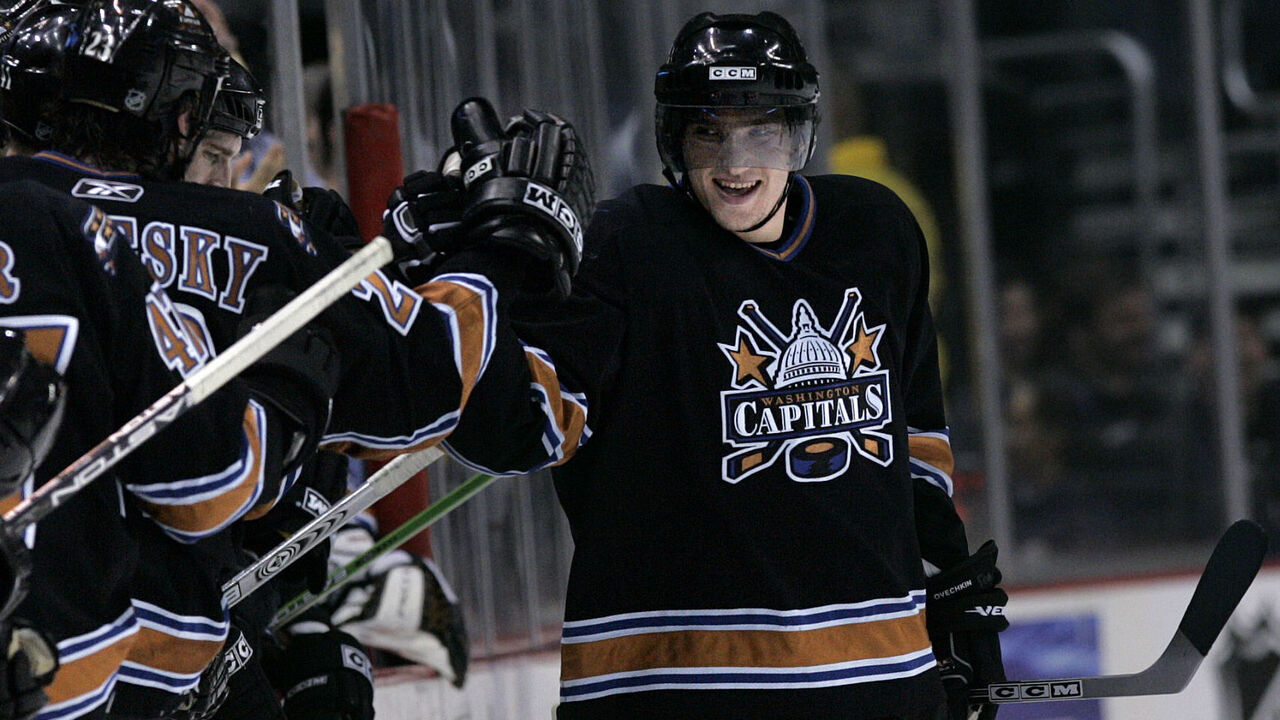
Clymer: Ovi's this kid coming into the league. He's got this jovial exuberance. It was neat. You don't see it all the time - someone willing to express the pure joy of scoring or playing or hitting. Particularly in a time with the franchise where it wasn't necessarily always fun and games. The Caps had been struggling, which is how they got the No. 1 pick.
Kolzig: We were losing a lot of games. The building probably had more empty seats than people in it. It wasn't a great time to be a Caps fan. Then you see this generational kid come in with his unbridled enthusiasm and raw power. The way he scored goals, all of a sudden, it piqued everybody's interest again in Washington.
Beninati: He was an eye-catcher. Everything about his game drew your attention. He was electric at the outset of his NHL career.
'They call him the Russian machine'
Ovechkin scored eight goals in 11 games in the first month, fueled by three multi-goal efforts. His offensive tool kit was revolutionary. He picked corners and roofed loose pucks. He corralled deflected passes, skated through bodies and sticks, and unleashed filthy dekes on his explosive drives to the net. Young Ovi was a rampaging bull, not a one-trick pony.
Beninati: When people think about Alex over 20 years, they envision a lot of one-timers from that left faceoff circle. Cross-ice passes and his slap shots that overwhelm the goalies. But he was scoring in a variety of ways in that rookie season.
Sutherby: He was a full threat. He would attack off the rush in a similar way as Nathan MacKinnon or Connor McDavid do now. Ovi had an ability to skate, stickhandle, and shoot at a speed that many defensemen had never seen.
Beninati: There were breakaways. He was posted at the side of the net for rebounds. Individual backhand moves where he'd undress a defender and go in on world-class goalies and score. Guys like Cam Ward and Roberto Luongo, he's scoring on them early in his career in the most surprising and creative ways.
Willsie: Him flying down the left wing in our home rink and being able to beat that defenseman time and again - that's what I remember most. It was the first year without obstruction, so there were no can openers or clutching and grabbing.
Clark: Not the smoothest skater, but he was so powerful. Stride for stride, you didn't realize how fast he was going until he blew by someone or, if you were a D-man, he blew by you.
Hanlon: It was coming down and shooting in stride or cutting to the middle and using a screen and scoring. His trademark spot on his right-hand one-timer, I don't recall him being there much. We didn't have Nicklas Backstrom yet to set him up. We didn't have T.J. Oshie. But if there was a chance to score, he was going to take full advantage.
Kolzig: He's 240 pounds of pure muscle. When he gets the puck perfectly in the center of his blade, it's a catapult.
Beninati: There's even a shorthanded goal in the first month. A beautiful breakaway, forehand deke.
Hanlon: Assistant coach Jay Leach was using him on the penalty kill. It was something to make sure he got his minutes. At that point in time, you're trying to get him engaged in everything.
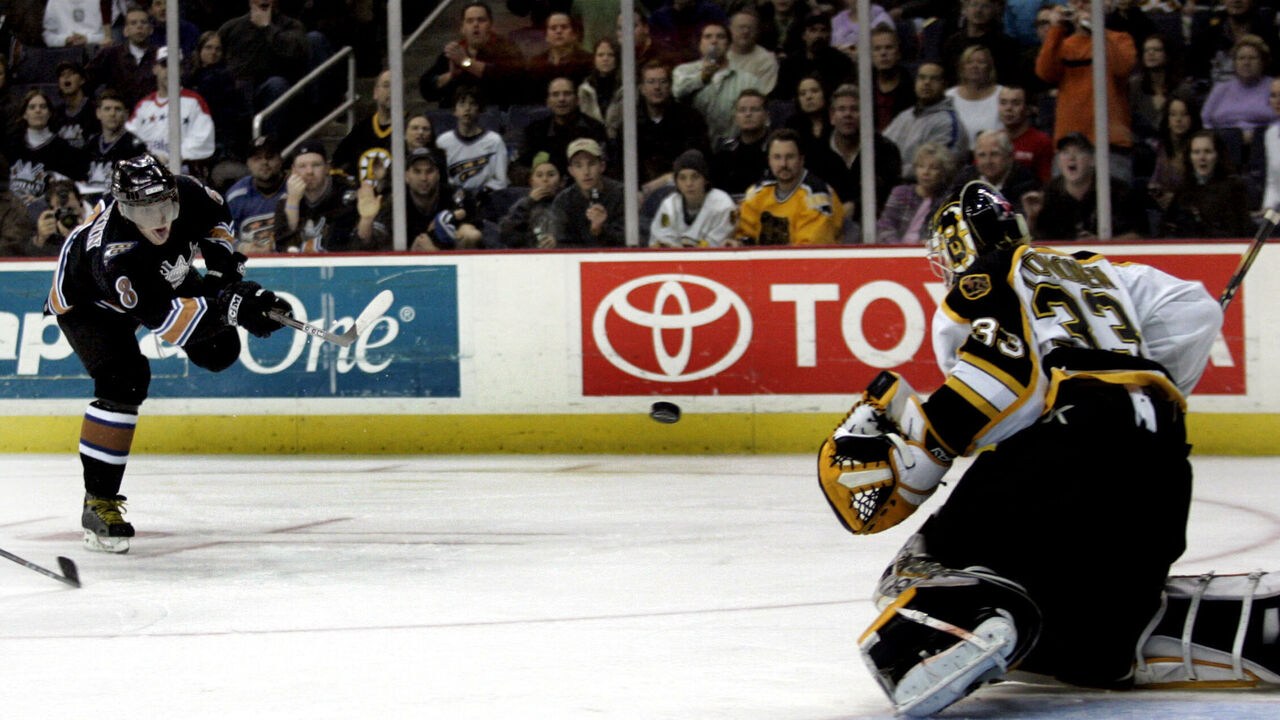
Beninati: Take a look at that first month and you'll see these amazing examples of what was to come. Speed. Power. Puck protection. Unbelievable hand-eye coordination. Not afraid to be in front of the goal. Big enough to be in front of the goal and cause a problem.
Willsie: He wasn't a perimeter player. We called it "offensively physical." Ovi was willing to get in there and take hacks and whacks. He had no trouble getting inside ice. He was so physically strong and had such a strong stick. He could score from distance and off the rush, but he also scored his fair share right around the blue paint.
Clark: The buzz kept building as the season went along. He became must-see hockey.
Pettinger: Every time he scored, you had to watch out. He'd black out in his celebrations. Going in for a scrum after a goal, you didn't know if you were coming out with a banged-up shoulder or concussion. I don't know if people understand how big Ovi is. He made some punishing hits in his early days.
Sutherby: He would get on the forecheck and finish checks on defensemen. He made their lives miserable. I don't know if there was a player quite like him who had the speed, the offensive ability with the shot, and then the ability to run you through the end of the rink.
Willsie: When you hit that much and get hit and whacked because you have the puck so much, it's hard not to get injured. Being around him, being his road roommate, there were some days when he was pretty beat up. He was sore, whether it's knee soreness or back aches.
Hanlon: He played hard minutes. He was hurt but never injured. There were games where I'd go, "Oh, God. There's no way he's playing." You'd see him try to get the body going to play. He never missed a game.
Muir: He's a machine. They call him the Russian machine, right? And he is.
Pettinger: His legs are massive. His back is massive. He always played on the edge where I'm sure coaches and GMs for the Caps were sitting there going, "We can't have this guy miss any games." But that was just part of the way he played. It's almost like you didn't want to take it away from him.
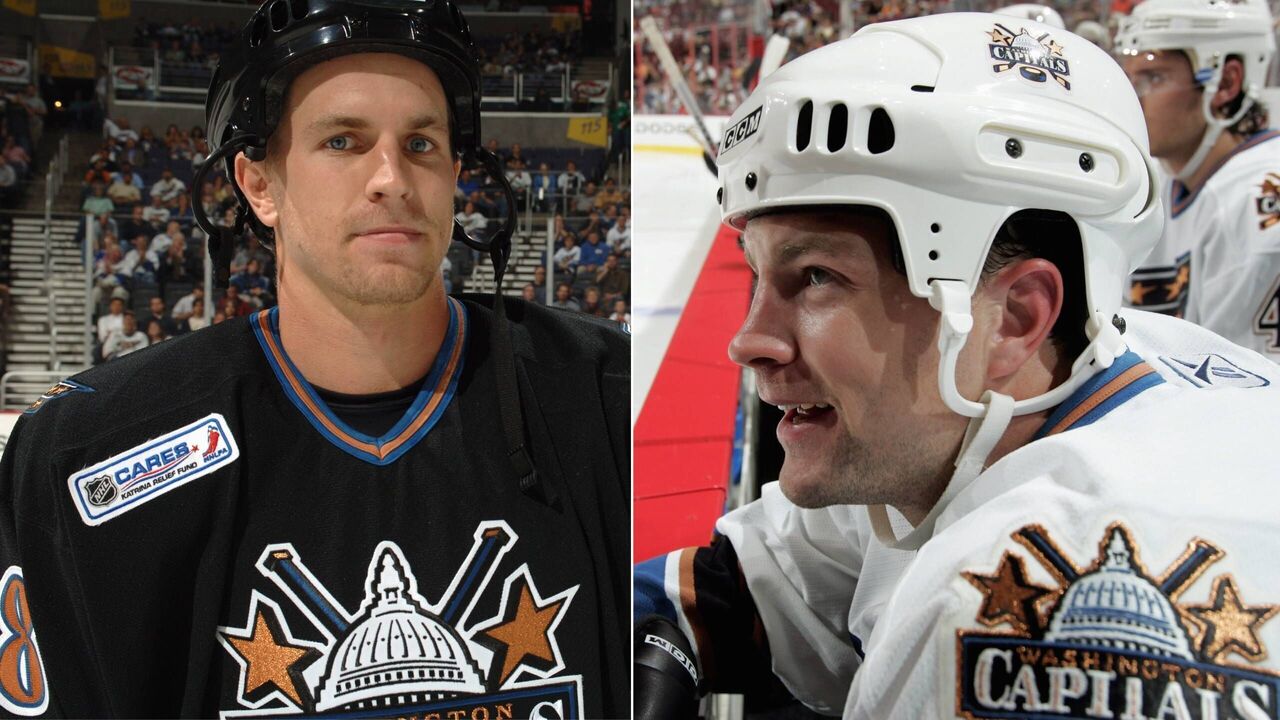
Clymer: There were times in that season when he was rambunctious and somebody like Donald Brashear would be like, "Hey, boys, you need to deal with him." And it'd be like, "I've got him, so just back off for a moment."
Hanlon: Our message from our staff was to watch his shift lengths, because that can really get you in trouble with your teammates. On the defensive side of the red line, just play Capital hockey, and once you get the puck, you've got the freedom to do whatever you need. We tried to keep it simple and not break his spirit.
Willsie: I always thought of it as: Get the puck on the right wing and rip it over to the left side. It didn't even have to be a good pass because he's such a great player. He's high-stepping up the ice, and those gold chains he wore are bouncing off the front of his jersey as he's skating. You're hanging on the ice long enough, hoping to get a plus before making a line change because he's usually scoring. (Laughs)
'He would throw on anything Dolce'
Off the ice, young Ovi marched to his own drumbeat. He downed energy drinks and soda at a seemingly unhealthy rate and rocked outsider's clothing. His fashion sense was exotic in a sport known until the recent past for its severe lack of individuality. Ovi's most popular outfit - tight red jeans, Affliction T-shirt - made him an easy target for lighthearted dressing-room chirps.
Pettinger: His jeans literally looked like they came out of the dumpster. But it was his style. It was his flair.
Clymer: He couldn't get Dolce & Gabbana and those things in Russia, and all of a sudden, he could get them in the U.S. He's traveling, going to major cities, and he's got access to stuff he didn't have access to before.
Pettinger: He would throw on anything Dolce - even if it was a clown suit or a straw hat. You name it, he'd wear it if it had that branding.
Muir: He's Russian, man. The Russians then never really cared what people thought of their fashion choices.
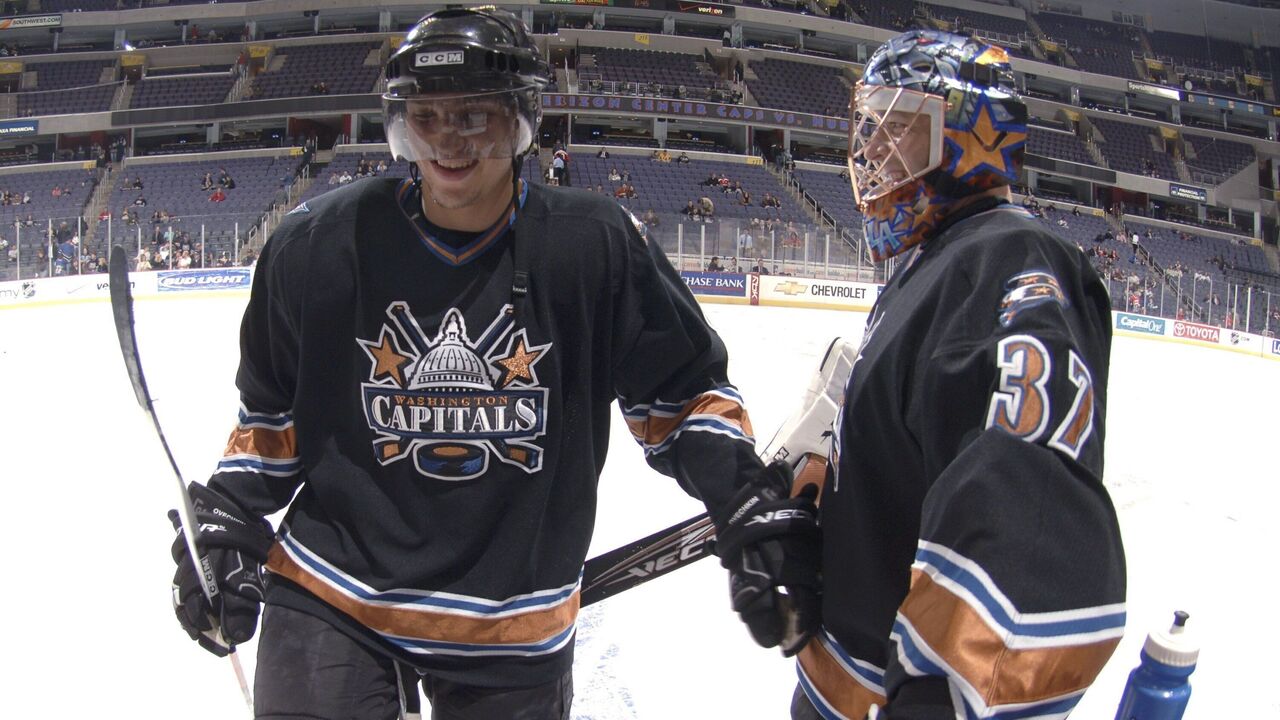
Pettinger: Olie Kolzig would roll his eyes a bunch of times, going, "Oh my goodness, Ovi, what are you wearing?"
Willsie: He used clothing to express his personality. If he took some ribbing or ripping, it didn't change his opinion on the way he dressed. Which was great to see. He was a confident young guy.
Muir: You look now at Auston Matthews or Mitch Marner or Patrik Laine, and they have these hats and fancy suits. You're like, "What on God's green earth are you wearing?" But they look good and that's their identity.
Clark: It's fun to have different personalities on a team. That's what makes up a good locker room: players being able to express themselves. He took it in stride because, obviously, he was going to get made fun of every once in a while. He loved it.
Sutherby: A lot of times there's an adjustment period, a language barrier, with players who come over from Europe and Russia. Sometimes that can make you more reclusive or quiet. I remember him being full of energy.
Kolzig: As a group, we loved that this kid who went first overall - and could have been arrogant and standoffish and want the world catered to him - was the exact opposite. To a man, we respected that in the kid.
Pettinger: I was at the golf tournament with him, on the same hole, when he got his hole-in-one. To this day, I get links from people asking if it's me in the video. He runs down to the green after and says, "I swear God!" His English is broken. But that sums up the excitement he brought every day.
Ovi had a big-brother teammate in Zubrus, the Russian-speaking Lithuanian center, but insisted on rooming with a North American to learn the culture and language. Clymer, a 27-year-old from Bloomington, Minnesota, assumed the role in training camp. Willsie, 27 and from near London, Ontario, took over in the regular season. Ovi and Willsie grew close - the mentor keeping mentee on schedule daily, the mentee keeping mentor enthusiastic at the end of long road trips, and both enjoying each other's company over room-service dessert indulgences.
Clymer: I step into my hotel room during training camp and there's this 20-year-old kid playing the NHL EA Sports video game. He's playing as the Capitals, and he's created himself as a character. He's on the edge of the bed, close to the TV, because the controller isn't cordless.
Willsie: This was his first year in North America, so as far as hockey games being on TV, this was heaven for him. You come to Canada, turn on the TV, and it's hockey, hockey everywhere.
Clymer: I was trying to be supportive and understand the difference in where I was at in my life versus where I would be at his age - 20 and excited about a season starting. I remember sitting on the bed and being like, "Alright, this is atypical ... " (Laughs)
Willsie: We were in Toronto about a month into the season. He would nap on game days, but he was just so excited for the first game in Canada that he spent the afternoon walking around the city. He comes back to the hotel, we get ready for the game, go to the rink together. Then, of course, he had a couple of goals. That's just who he was. He had this passion and excitement for playing in the hockey hotbed atmosphere. He wanted to soak it all in.
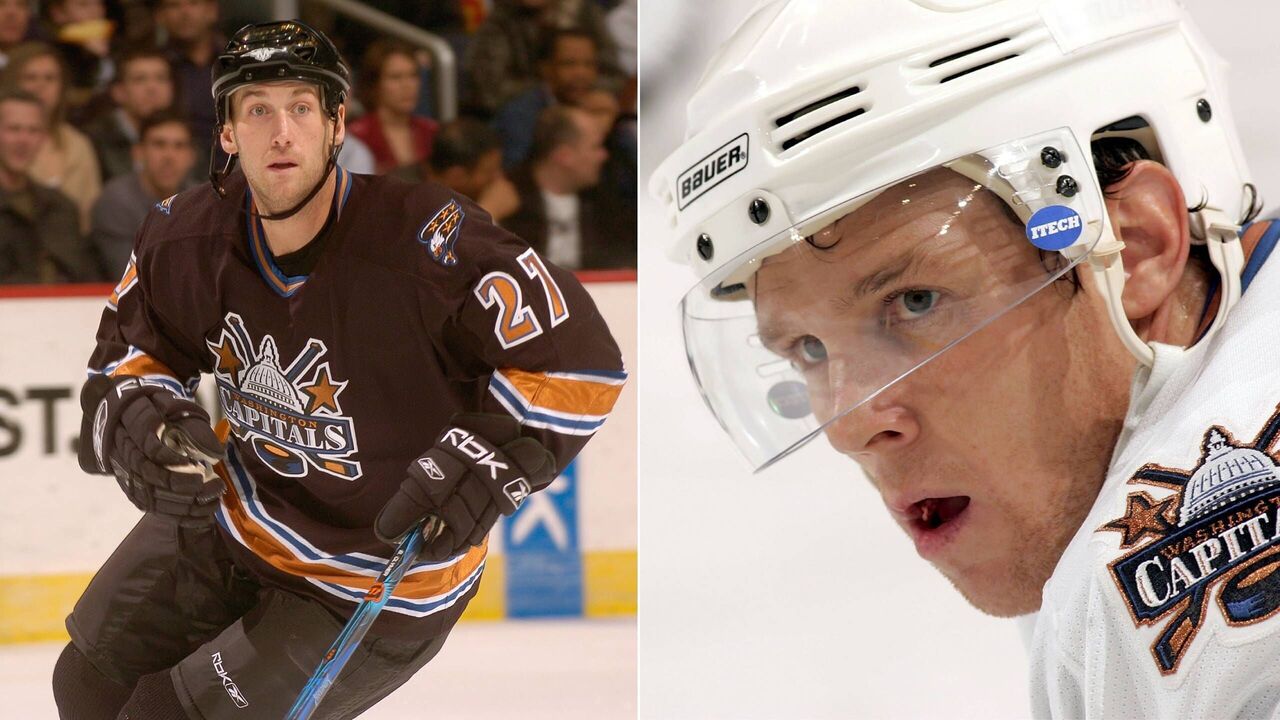
'Anything is possible with this young man'
Ovechkin's first Capitals team was close-knit. He liked to dine with teammates, play poker, swap stories, and "do funny shit" to bond with the group on the road, Willsie said. The prized rookie was one of the guys, only with superlative talent that helped him dominate a memorable swing through the Western Conference in mid-January. He tallied his first hat trick and his most iconic goal on either side of the club's rookie party, a boozy annual tradition.
Willsie: It was a three-game trip: Dallas, Anaheim, Phoenix. Dallas: We lose and he scores our only goal. The very next night we play in Anaheim, we win 3-2 in overtime, and he scores all three goals.
Clymer: In Anaheim, Alex was basically on the train tracks and about to get run over by Vitaly Vishnevski. I remember standing up - in fact, pretty much the whole bench did - to yell, "Heads up!" And Alex ran over him like he was a speed bump. I thought his life was going to end and he just went right through this guy.
Willsie: We're immediately going from Anaheim to Arizona, so he literally sprinted to the dressing room after the OT goal. Get the gear off and get on the plane as fast as you can. And then we get to Phoenix, have a rookie dinner in Scottsdale, and he was a big part of it.
Clymer: We had a really good time on that road trip. Let me just put it that way. (Laughs)
Willsie: I remember him having the time of his life. He ends up walking into our hotel room at the end of the night with a team-signed champagne bottle. That was the keepsake of the night for him.
Kolzig: He would come out with us all the time for dinner on the road. He would always immerse himself with us. That's why we all came to love him.
Clymer: It's nice to be engrossed in the team. At that time, he didn't have a family to go home to. He was alone. So, it was probably an awesome six days for him.
Willsie: Something you have to learn as a young player: You enjoyed yourself away from the rink, and it was a big win in Anaheim and a couple of good nights in Arizona, and now it's play-guilty time. We need to buckle down and get a win in our last game of the trip. He understood that. I don't think that's why he scored the goal from his back, but whatever it takes to win, right?
You remember the goal. Late in a blowout victory, Ovechkin retrieved a banked clearance at center ice and steamed toward Coyotes defenseman Paul Mara, who played the body and knocked him off balance. Ovechkin defied physics by rolling onto his back and flicking his wrists in one fluid motion to slide the puck inside the near post. The amazed onlookers who stared skyward to see the replay included Gretzky, the opposing head coach.
Beninati: That one in Phoenix with Wayne looking on - the one that's referred to as "The Goal" - you realize that almost anything is possible with this young man.
Muir: It was the ability mixed with the passion. How do you do that, right?
Clymer: There's incredible skill that goes into that goal. But there's luck, too. Brian Boucher reading it the way he did - I don't know from a goalie's perspective what the heck you're supposed to be doing. Mara was the defenseman, and it's like, you kept him on the outside? What else are you supposed to do? Maybe you can attack the puck a bit more with your stick? There's not a lot of blame to be thrown on those players who were on the ice for that dynamic, falling, somersault, rolling goal.
Muir: People always tell me I'm so good at hockey when I'm at a charity event. I tell them they just don't understand what good is. I'm not good at all. The difference between those elite players - the Crosbys, MacKinnons, McDavids, Ovechkins - is so vast even in the NHL.
Kolzig: As the season went on, he kept scoring. People in other cities got to see this kid. He became such a buzz in the league. Obviously, the goal in Phoenix cemented that first year for him and what kind of player he was.
Sutherby: You sensed early on that he loves scoring goals and he loves to win. And he loves his teammates. He would get just as excited about someone else scoring a goal.
Kolzig: He has an old-school mentality. He could have fit in with the guys in the 1970s and '80s with the way he approaches the game. I think he'd rather have a Bud Light after a game than a protein shake. The guys just love being around him.
Willsie: A lot of his personality was that excitable, gregarious kid who was playing with passion. That's the way he was all the time: in practice, in the dressing room, at dinners. That year, we didn't win a ton, so you lose four or five in a row, but he still had that same attitude. Wanted to win. Ultracompetitive. The excitability was infectious for the rest of us.
'I think he'll go bananas'
A week after the jaw-dropper in Arizona, Beninati and his color analyst, Craig Laughlin, joked on air that Ovechkin "only" needed 860 more goals to chase down Gretzky's record. The broadcasters shared a laugh and wished him luck. Their quips weren't sarcastic. They didn't mean to disparage or mock a generational sniper. It's just that the challenge was enormous.
Sutherby: As much as he made you come out of your seat - as much excitement as he generated when we were playing together - if you asked me back then if anybody could break Gretzky's record, I would have said no.
Hanlon: As great as he was, you don't look at first-year players and think they're going to be iconic.
Kolzig: I thought there was no way in hell that somebody was going to break any of Gretzky's records. You need longevity. You need luck. This is obviously a biased opinion, but the goalies are better now. I never even thought about it, and then in preseason three years ago, I was looking at the stats and I'm like, "Wow. You know what? He's getting older, but if he stays on the current pace, he could break it in three, four years."
Beninati: No. 500 against Ottawa. I'll never forget the way the building reacted that night. The fans were spectacular. The buzz, the atmosphere was overwhelmingly positive. That's the first time I thought: maybe, just maybe. At that time, there were so many more goals to go, and so many more games, and this guy is so physical. I knock wood every time I say it: he's been healthy for so long, and blessed with the talents that he has - the speed, the power, the ungodly shot - those things add up.
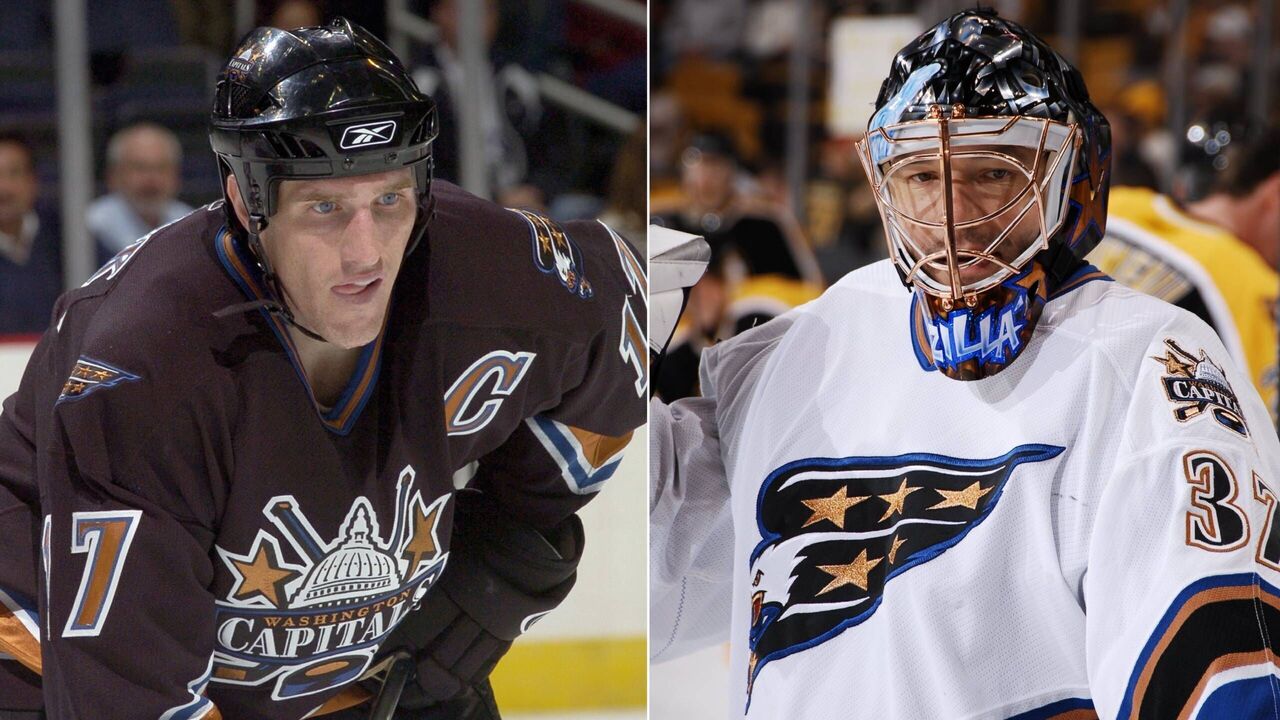
Clark: I always tell people: "Maybe he'd already be there if he didn't play with me on a line for a couple of years." That's been my joke. He persevered through that stumbling block in his career.
Beninati: And here we are on the verge of something almost unthinkable.
Willsie: He could break the record in the same season that he broke his leg. Isn't that crazy to think about? It is but it's also not. Battling through an injury is just who he is. That's been the story of his whole career: the durability despite not being a perimeter player and picking cherries.
Beninati: As disruptive, physical, and bone-crunching as he's been throughout his career, his attendance record is always there.
Kolzig: He's been around so long now that our first-round picks had his poster on the wall. Hendrix Lapierre grew up idolizing him. I know Ivan Miroshnichenko idolized him. Bogdan Trineyev idolized him. He isn't what he used to be. He's slowed down a little bit. But he still comes in and they see how he approaches the game.
Muir: We were joking after the first year: "Can this kid keep this pace up?" Because he was running guys over and scoring 50 goals. It was Jamie Heward, me, Kolzig, Willsie - some of the older guys - talking to Ovi, being like, "You can score the goals, but the physical side of the game, you have to be careful and manage it." But he never stopped. There was that fight with Andrei Svechnikov in Carolina in 2019. Ovi always does things at 100%. The passion that he has for scoring goals, I've never seen it in anyone else.
Hanlon: I think he'll go bananas when he sets the record. He's an emotional, passionate guy. I hope it all works out so that he does it in front of his own crowd.
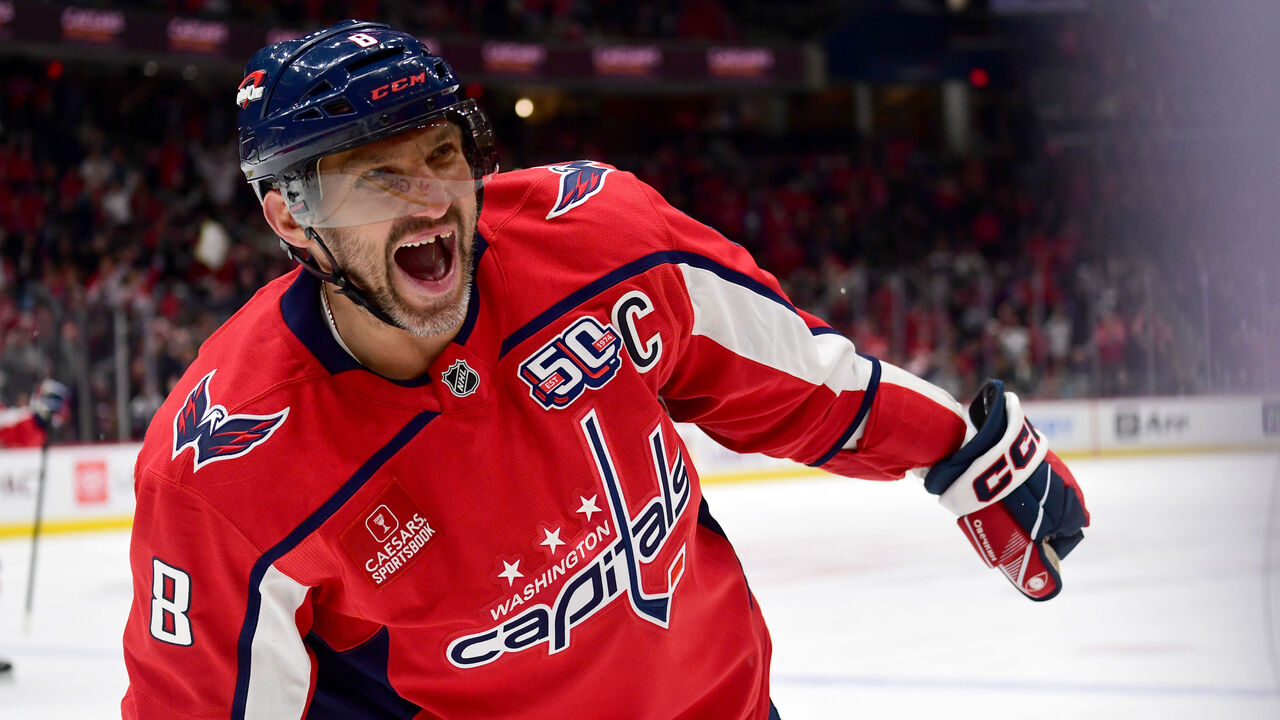
Kolzig: I hope to be in the building when he does it. I do player development with the Capitals, so I'm on the East Coast quite a bit. He's going to have a lot of people there who he's going to celebrate with. But I hope there's a bunch of us who played with him there, and we can go out on our own and reminisce and enjoy the moment.
Beninati: You cross your fingers and hope and pray that No. 895 is a nice, clean Alex Ovechkin goal. You want it to be a beautiful breakaway. You want it to be a one-timer where you see the net bulge. It's not one of these shots that squeaks to the goal line and the goalie puts his glove on it and: "Was it across!?" Oh, God. I shiver thinking about it.
Kolzig: It's within reach, and the team's going to do everything it can to get him in position to break it.
Beninati: Please let it be a no-doubter. Then you can forcefully deliver it, describe it, salute it, and then shut up. Let the crowd love him. Let the game love him.
Clark: It'll be awesome. He deserves a big hug when I see him the next time after it happens.
Beninati: One of the great things about Alex is he's a great celebrator. He's good at making sure there are the arms in the air. There's the kiss to Sergei. There's the glass jump. You'll know that it's his. I just want it to be nice and clean. You want it to be Alex flying down the wing and blasting it past a goalie.
John Matisz and Nick Faris cover the NHL for theScore.
HEADLINES
- Matthews: 'You want to go up and get' 1st in Atlantic Division
- NHL bucks recent trends by extending Rogers' TV stranglehold
- NHL stretch-run roundtable: East's wild-card race, Ovi's date with history
- Roy slams 'god-awful' Duclair: 'Lucky to be in the lineup'
- Oilers sign SHL top scorer Tomasek to 1-year, $1.2M contract